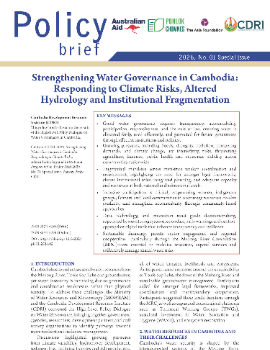
Strengthening Water Governance in Cambodia: Responding to Climate Risks, Altered Hydrology and Institutional Fragmentation
Good water governance requires transparency, accountability, participation, responsiveness, and the rule of law, ensuring water is allocated fairly, used efficiently, and protected for future generations through effective institutions and policies.Growing pressures, including floods, droughts, pollution, competing demands, and climate change,...
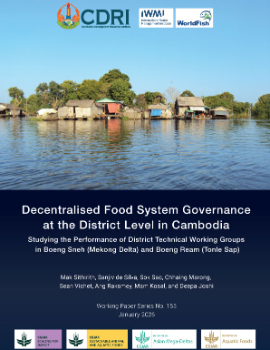
Decentralised Food System Governance at the District Level in Cambodia: Studying the Performance of District Technical Working Groups in Boeng Sneh (M...
This working paper examines decentralised food system governance at the district level in Cambodia through an assessment of District Technical Working Groups (DTWGs) established in Boeng Sneh (Mekong Delta) and Boeng Ream (Tonle Sap). These floodplain ecosystems are critical for rice production, fisheries, and rural livelihoods but face increas...
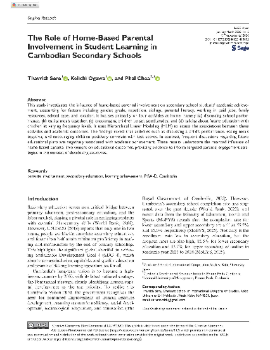
The Role of Home-Based Parental Involvement in Student Learning in Cambodian Secondary Schools
This study investigates the influence of home-based parental involvement on secondary school students’ academic achievement, accounting for factors including gender, grade, repetition, siblings, parental literacy, working in paid jobs, family resources, school type, and location. It focuses primarily on four activities at home, namely (a) discussin...
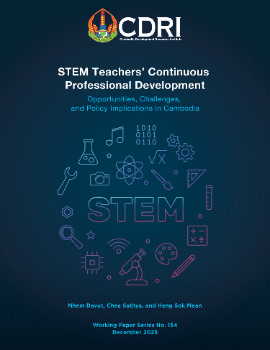
STEM Teachers’ Continuous Professional Development: Opportunities, Challenges, and Policy Implications in Cambodia
As Cambodia aims to become an upper-middle-income country by 2050, STEM education is recognised as a pivotal element in this transformation. However, significant challenges impede educational development, including a shortage of qualified STEM teachers, insufficient training, and limited resources. In this regard, this study addresses the press...
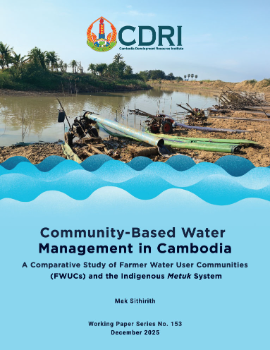
Community-Based Water Management in Cambodia: A Comparative Study of Farmer Water User Communities (FWUCs) and the Indigenous Metuk System
This working paper examines community-based water management in Cambodia through a comparative analysis of Farmer Water User Communities (FWUCs) and the indigenous Metuk system in the Tonle Sap floodplain. Drawing on qualitative case studies from Kakaoh Commune in Kampong Thom Province and Santey Village in Siem Reap Province, the study analyse...
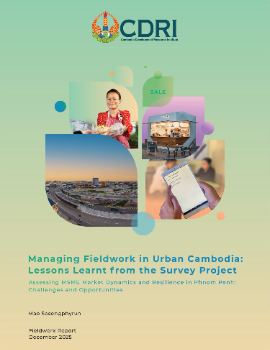
Managing Fieldwork in Urban Cambodia: Lessons Learnt from the Survey Project “Assessing MSME Market Dynamics and Resilience in Phnom Penh: Challenges...
This report shares fieldwork experiences from a large-scale survey conducted in Phnom Penh in early 2025, focusing on micro, small, and medium enterprises (MSMEs) in Khan Meanchey. With over 14,000 businesses surveyed, the project aimed to gather reliable data to support policy decisions and project planning, particularly by capturing information a...
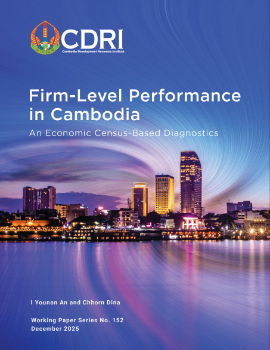
Firm-Level Performance in Cambodia: An Economic Census-Based Diagnostics
Cambodia’s enterprise landscape remains structurally dualistic, characterised by an extensive base of micro and informal firms coexisting with a narrow segment of large, often foreign-owned enterprises. Using the Economic Census of Cambodia 2022, this study examines the determinants of firm performance and the structural conditions shaping business...
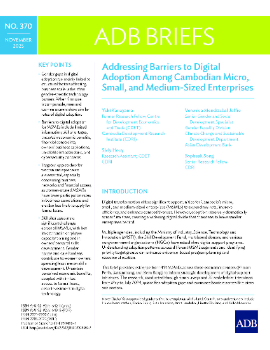
Addressing Barriers to Digital Adoption Among Cambodian Micro, Small, and Medium-Sized Enterprises
Gender gaps in digital adoption are mainly linked to structural factors affecting business scale rather than gender-specific technology barriers. When firm size is comparable, men and women owners show similar rates of digital adoption.Barriers to digital adoption for MSMEs include limited information, skill shortages, uncertain economic benefits,...
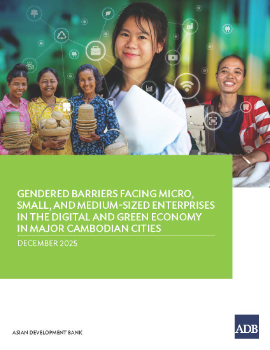
Gendered Barriers Facing Micro, Small, and Medium-Sized Enterprises in the Digital and Green Economy in Major Cambodian Cities
Drawing on extensive data and stakeholder insights, it reveals how unequal access to knowledge, finance, and networks can hold back enterprises owned by women. The report sets out targeted policy recommendations for inclusive economic development where women entrepreneurs are empowered to lead in the digital and green economy.For the full report, p...
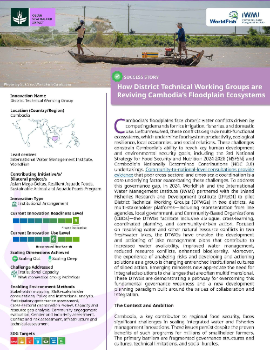
How District Technical Working Groups are Reviving Cambodia’s Floodplain Ecosystems
Cambodia’s floodplains face chronic water conflicts driven by competing demands for rice irrigation, fisheries, and domestic use. Left unresolved, these conflicts degrade multi-functional ecosystems, which undermine food system productivity, ecological resilience, local economies, and social relations. These challenges constrain Cambodia’s ability...
